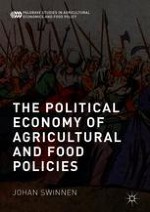2018 | OriginalPaper | Buchkapitel
2. Political Coalitions in Agricultural and Food Policies
verfasst von : Johan Swinnen
Erschienen in: The Political Economy of Agricultural and Food Policies
Verlag: Palgrave Macmillan US
Aktivieren Sie unsere intelligente Suche, um passende Fachinhalte oder Patente zu finden.
Wählen Sie Textabschnitte aus um mit Künstlicher Intelligenz passenden Patente zu finden. powered by
Markieren Sie Textabschnitte, um KI-gestützt weitere passende Inhalte zu finden. powered by
